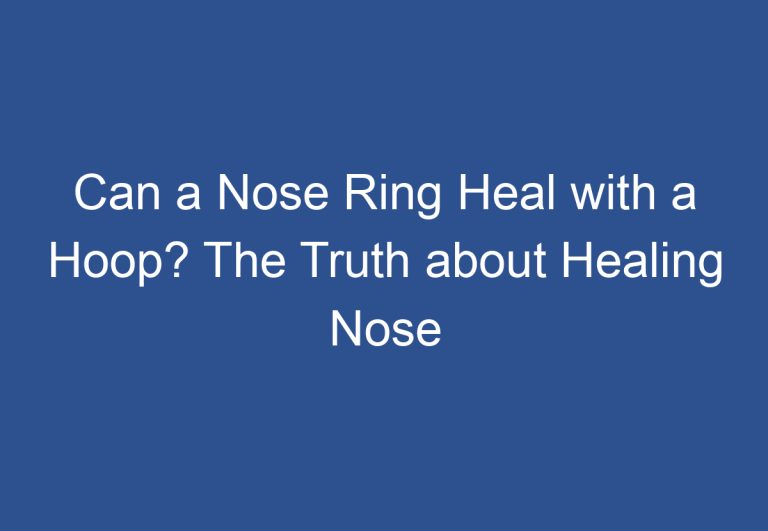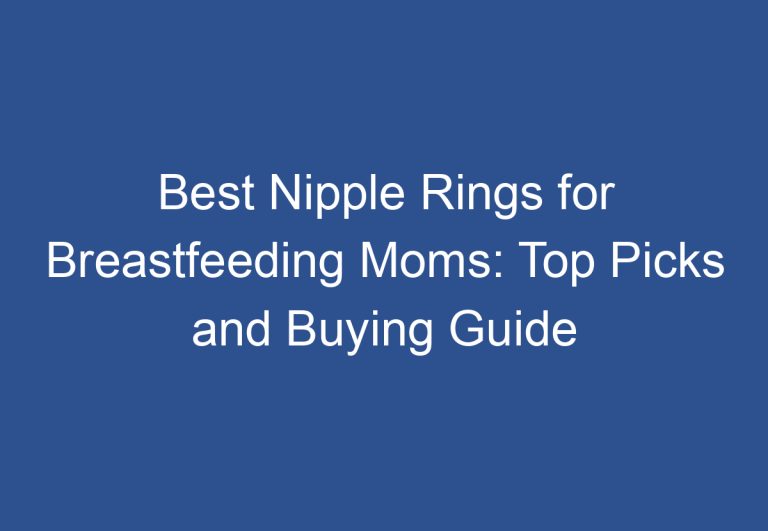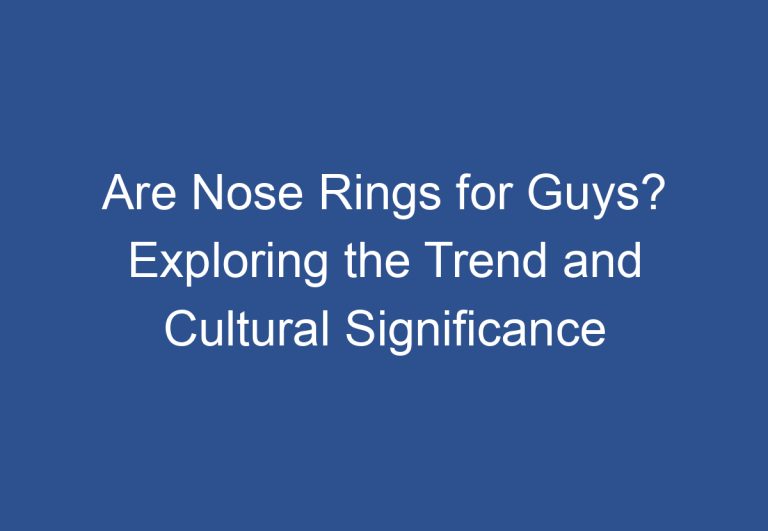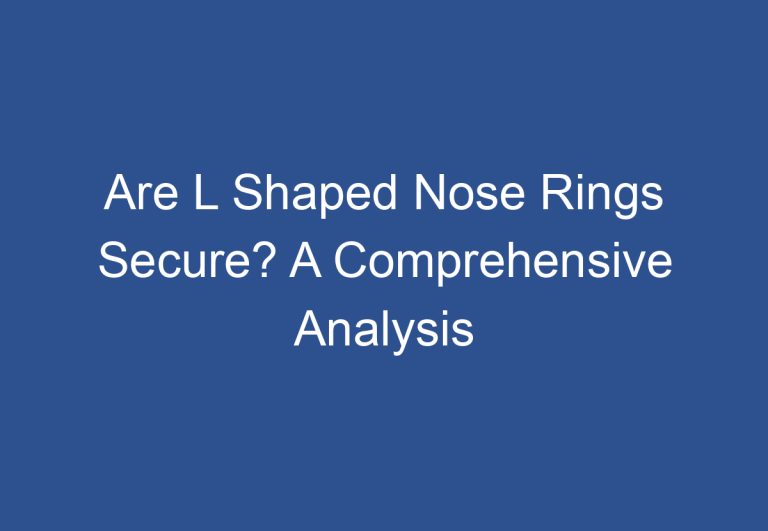Can a Nose Ring Cause Sneezing? Exploring the Possible Connection
Nose rings have been a popular form of body modification for centuries, with people of all ages and genders sporting them for various reasons. While nose rings are generally safe, some people have reported experiencing sneezing after getting their nose pierced or wearing a nose ring. This has led to the question: can a nose ring cause sneezing?

The answer to this question is not a straightforward one. While there is no direct link between nose rings and sneezing, there are a few factors that could contribute to this phenomenon. For example, if the nose ring is too large or heavy, it could put pressure on the inside of the nose, causing irritation and triggering a sneeze. Additionally, if the nose ring is made of a material that the wearer is allergic to, it could cause an allergic reaction, which could result in sneezing.
It is also worth noting that sneezing is a common symptom of various health conditions, such as allergies and colds. Therefore, if a person experiences sneezing after getting a nose ring, it may not necessarily be due to the nose ring itself. However, if the sneezing persists or is accompanied by other symptoms, it is important to consult a healthcare professional to rule out any underlying health issues.
Understanding Nose Ring-Related Sneezing

Nose rings are a popular form of body jewelry, but they can sometimes cause sneezing. This section will explore the common causes of sneezing after piercing, the symptoms and complications that can arise, and how to care for your nose ring to prevent sneezing.
Common Causes of Sneezing After Piercing
Sneezing after getting a nose ring can be caused by a variety of factors. One common cause is an allergic reaction to the metal used in the nose ring. Some people are allergic to nickel, which is commonly used in jewelry. This can lead to sneezing, as well as other symptoms like itching, swelling, and redness.
Another cause of sneezing after piercing is irritation from dust or other allergens. When the nose is pierced, it becomes more sensitive to irritants in the air. This can lead to sneezing, as well as other symptoms like coughing, watery eyes, and a runny nose.
Symptoms and Complications
Sneezing is just one symptom that can occur after getting a nose ring. Other symptoms can include pain, swelling, and bleeding. In some cases, complications like infection, hematoma, nerve damage, and scar tissue can occur.
If you experience any of these symptoms or complications, it is important to seek medical attention right away. Your doctor can help you develop a treatment plan to address your symptoms and prevent further complications.
Nose Ring Care and Hygiene
To prevent sneezing and other complications after getting a nose ring, it is important to take proper care of the piercing site. This includes cleaning the area regularly with a saline solution, avoiding touching the piercing with dirty hands, and avoiding irritants like dust and allergens.
It is also important to choose a nose ring made from a hypoallergenic metal like titanium or gold. This can help prevent allergic reactions and other complications.
In summary, sneezing after getting a nose ring can be caused by a variety of factors, including allergies and irritants. It is important to take proper care of the piercing site to prevent complications and seek medical attention if necessary. By following these tips, you can enjoy your nose ring without experiencing sneezing or other symptoms.
Prevention and Management Strategies

If a nose ring is causing sneezing, there are several prevention and management strategies that can help alleviate the symptoms. These strategies can be grouped into three main categories: avoiding and managing allergens, medical interventions and remedies, and lifestyle and environmental adjustments.
Avoiding and Managing Allergens
One of the most important steps in preventing and managing sneezing caused by a nose ring is to avoid or manage allergens. Allergens can include dust, pollen, mold, tobacco smoke, pets, dander, foods, and chemical fumes. To avoid allergens, it is important to keep the environment clean and free of dust and other irritants. Using an air purifier, vacuuming regularly, and washing bedding frequently can help reduce exposure to allergens.
Medical Interventions and Remedies
If avoidance of allergens is not enough, medical interventions and remedies may be necessary. These can include nasal sprays, antihistamines, and other medicines that can help reduce inflammation and histamine levels in the body. Decongestants can also help alleviate nasal congestion and pressure.
In some cases, a nose ring may cause bleeding or an allergic reaction. If this occurs, it is important to seek medical attention immediately. In rare cases, a nose ring can also cause chronic sinusitis or nasal polyps, which may require more extensive treatment.
Lifestyle and Environmental Adjustments
Finally, making lifestyle and environmental adjustments can also help prevent and manage sneezing caused by a nose ring. This can include avoiding strong odors and perfumes, getting enough rest, and managing stress levels. It is also important to stay hydrated and avoid alcohol and aspirin, which can exacerbate symptoms.
In conclusion, while a nose ring may cause sneezing in some individuals, there are several prevention and management strategies that can help alleviate symptoms. By avoiding allergens, using medical interventions and remedies, and making lifestyle and environmental adjustments, individuals can reduce the risk of sneezing and other symptoms associated with nose piercings.
Frequently Asked Questions

What are the potential effects of a nose piercing on sneezing frequency?
A nose piercing can have various effects on sneezing frequency, depending on the individual’s sensitivity and the type of jewelry used. Some individuals may experience increased sneezing frequency due to irritation caused by the piercing, while others may not experience any changes. It is important to monitor any changes in sneezing frequency after getting a nose piercing and seek medical attention if necessary.
How can a new nose piercing influence nasal discharge?
A new nose piercing can cause temporary changes in nasal discharge due to the healing process. It is common for the piercing to produce more discharge than usual, which can be clear or slightly yellowish. This discharge is a sign that the piercing is healing properly. However, if the discharge is thick, green, or foul-smelling, it could be a sign of infection and medical attention should be sought immediately.
Is there a connection between nose piercings and increased sinus sensitivity?
There is a potential connection between nose piercings and increased sinus sensitivity, especially if the piercing is not properly cared for. The piercing can become infected, which can lead to inflammation and increased sensitivity in the sinuses. It is important to keep the piercing clean and follow proper aftercare instructions to minimize the risk of infection and sinus sensitivity.
What are the best practices for managing nasal hygiene with a nose ring?
Proper nasal hygiene is essential when wearing a nose ring. It is recommended to clean the piercing twice a day with a saline solution or a mild soap and water. It is also important to avoid touching the piercing with dirty hands and to remove any excess discharge or debris around the piercing. Additionally, it is recommended to avoid blowing the nose forcefully and to use a soft tissue to avoid irritating the piercing.
Can the presence of a nose ring exacerbate allergy symptoms?
The presence of a nose ring can potentially exacerbate allergy symptoms, especially if the individual is allergic to the metal used in the jewelry. It is important to choose hypoallergenic materials, such as titanium or surgical steel, to minimize the risk of allergic reactions. If allergy symptoms persist or worsen, medical attention should be sought.
How should one blow their nose effectively when wearing a nose ring?
Blowing the nose gently and with caution is recommended when wearing a nose ring. It is important to avoid blowing the nose forcefully, as this can irritate the piercing and cause discomfort. To effectively blow the nose, it is recommended to hold one nostril closed and blow gently through the other nostril. It is also important to use a soft tissue and avoid rubbing the piercing.






